-Em-17-A Level-English Lit-Graphic Design- other studyblr: @printstudies
Don't wanna be here? Send us removal request.
Text
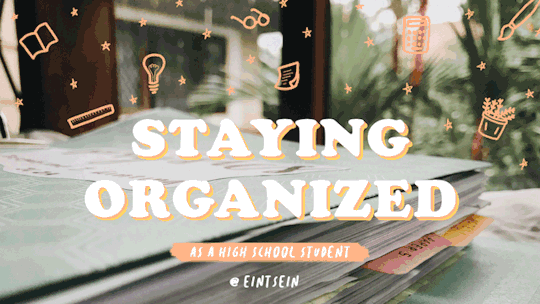
Hey guys, so I’m nearing the end of my senior year, and it’s been great so far! I accomplished my academic tasks efficiently and didn’t burn myself out, and I think the main contributor to my success as a student is my organization system. This system has been refined throughout my high school years, but I think now I’ve finally found the most effective methods.
Please remember that this isn’t the only organization system you can adopt; this is just the one that works the best for me, and I hope that by sharing it with you, you’ll gain a new perspective on how to stay organized as a high school student.

The first thing I wanna talk about is my notebook system, which I briefly mentioned in my Guide to Note-Taking.
My notebook system comprises three types of notebooks: the Everything Notebook, the subject notebook, and the revision notebook.
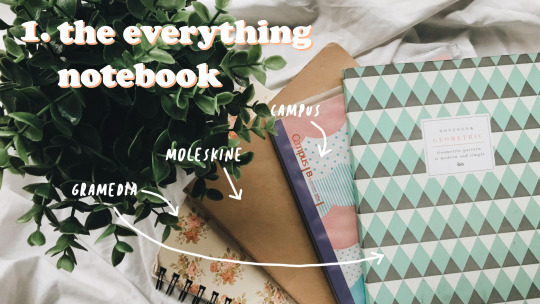
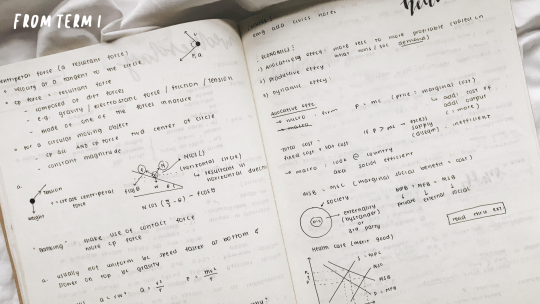
The Everything Notebook
The first stage is in-class notes. I only bring one notebook to school every day. I call it my Everything Notebook, and this is where I write down all of the notes I take in class. This way, I don’t have to lug around six notebooks where I’m only going to use a few pages in each of them that day.
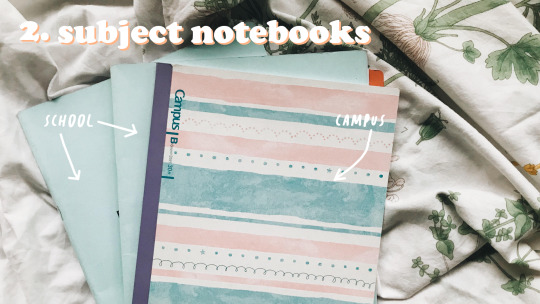
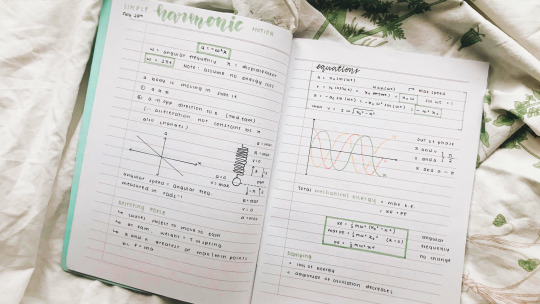
Subject Notebooks
At the end of the day, I would revise my notes and compare them to the syllabus so I know where we are in the learning process. I would then transfer my class notes from my Everything Notebook to my different subject notebooks. This is stage two. I also start to jazz up my notes because I use the notes in my subject notebooks to study for tests.
In addition to my class notes, I include material from my teachers’ notes that they might not have elaborated on, as well as points in the syllabus (I’m currently taking A2) that were only glazed over briefly, or not at all, in some cases. (Note: this does not mean they completely skip a chapter or topic; it’s more like they missed a few bullet points that should be in my notes but aren’t. An example would be if we’re learning about phenol reactions and the teacher forgot to mention the use of FeCl3 as a test for phenol.)
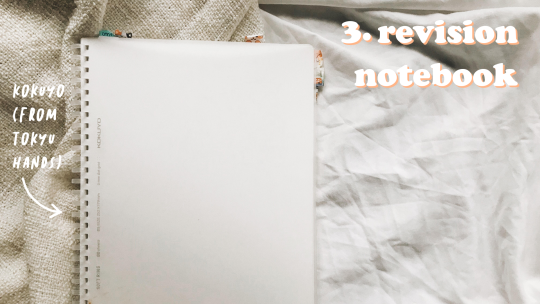
Revision Notebooks
Stage three comes a little later, when exam week is just around the corner. Essentially, I rewrite and improve my notes from my five different subject notebooks into a single revision notebook or binder. (Recently, I’ve opted for a revision notebook because they’re lighter and easier to carry around.)

Because my teachers don’t always teach in the order of the syllabus, the first thing I do is organize my notes according to the syllabus. I would then fill in any other missing gaps in the material that hadn’t been filled in stage two.
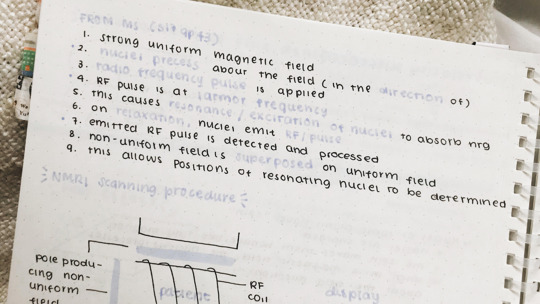
When compiling material for my revision notebook, I use as many sources as possible: my own notes, my teachers’ notes, youtube videos, online sites, and my favorite, the mark scheme! I add in some answers from past papers (explanations only, so no calculations) mainly to secure marks. It’s safer to memorize definitions straight from the mark scheme than from the textbook or from handouts. I also do this to ease my memorization, especially for topics that require lengthy explanations. It’s a lot easier to remember the 6 points I need to explain the principles of NMRI than to remember everything in the four-page handout my teacher gave me.

Folders and binders are essential to organizing your papers. Some people keep a single accordion folder for all their papers, but for me it’s just too heavy to carry around all the time. The same goes for subject folders that are brought to school every day.
Instead, my binder/folder system comprises my Everything Folder and my subject binders.
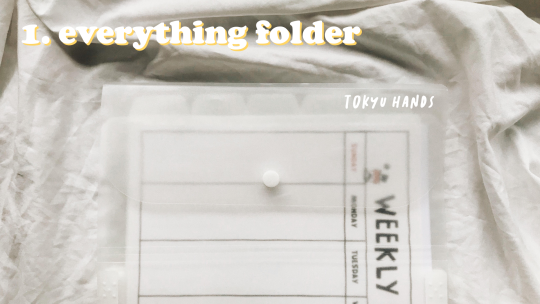
The Everything Folder
The folder I carry with me to school every day is this A4 folder I got from Tokyu Hands. It has 5 pockets, one for each day of the week, so all the papers I receive on Monday will go behind the first divider, and so on.
Some people also keep blank papers in their folders; I don’t because my school has its own lined paper and graphing pads that I keep under my desk that I use if a teacher asks us to do an assignment on those papers. If I do work at home, I prefer to just use a plain A4 paper or a legal pad.
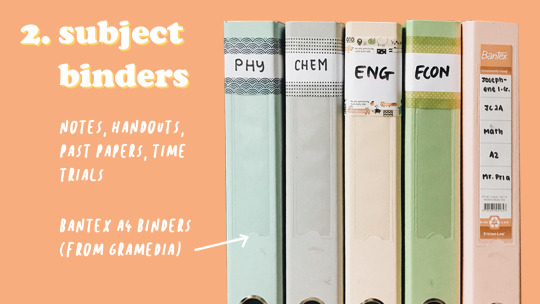
Subject Binders
At the end of the week, I’ll sort my papers into my subject binders. Sometimes I’ll keep some papers in the folder if I think I’ll be needing it the next week. This usually only applies to worksheets because all my teachers’ notes are available on Google Classroom, so I can access them even if I don’t physically have them.
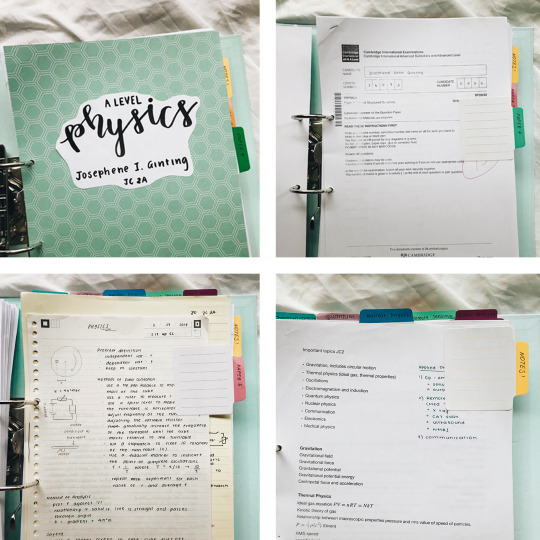
Each of these binders have sections inside them:
Physics: 1 for handouts, notes, and tests, 1 for Paper 4 (Theory), 1 for Paper 5 (Practical Planning). I included extra tabs to mark the different topics in the handouts section.
Chemistry: same as Physics.
Economics: 1 for Paper 3 (MCQ), 1 for Paper 4 (Case Study and Essay). A lot of my Economics material is online, though.
English: 1 for Paper 3 (Text and Discourse analysis), and 2 for Paper 4 (Language Topics, which includes 1 for Child Language Acquisition, 1 for World Englishes). Past papers, handouts, and notes all go under their respective topics.
Mathematics: I just keep everything together because I never revise math and just constantly do past papers.
This makes it easier for me to revise each subject because I can just take one binder with me instead of a messy folder with everything just shoved in there.

I keep a magazine file for each of my A-Level subjects (English and Mathematics are combined). All my textbooks, revision guides, and subject notebooks are kept here, so if I need to revise one subject, that’s the magazine file I’ll take out.
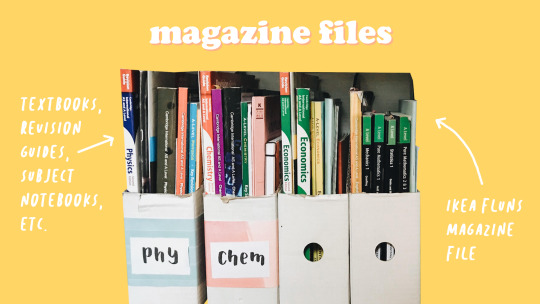
These magazine files prevent any small things (like my book of flashcards) from being shoved to the back of my bookshelf, or materials from different subjects from getting mixed up.

In my senior year, I mostly plan using this app called Edo Agenda. It syncs across all my devices for free and has all the features I need: a to do list to organize tasks, monthly and weekly calendars to organize events, a journal to organize notes and memos.

I used to bullet journal regularly, but it takes too much time during weekdays, so now I just bullet journal for the therapeutic effects it gives me, and I use an app for organizing tasks and events. Sometimes at the end of each week, I’ll transfer my tasks to my bullet journal and then decorate the page, but again, this is just for its therapy.

Organizing your school supplies is just as important as organizing your papers and notes. With a more organized backpack and pencil case, you won’t waste time looking for your things at the bottom of an abyss.
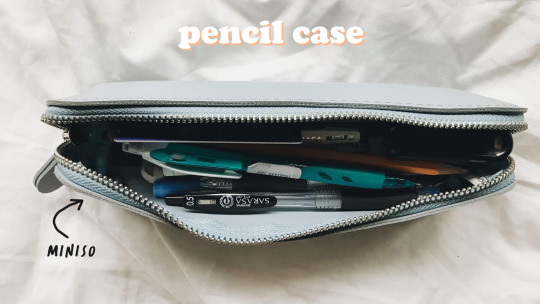
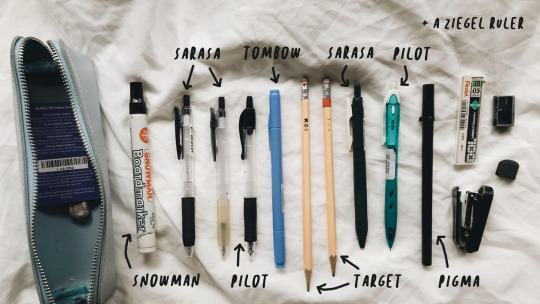
Pencil Case
I don’t find it necessary to bring so much stationery to school unless I plan on making notes at school (usually during revision week).
Backpack
Because we’re already in the revision term, I don’t really carry a lot of things in my everyday backpack, just the following:
Pencil case
Everything Notebook
Everything Folder
Revision notebook
Kindle
Phone
Wallet
Earphones
Calculator
Speaker
Drinking bottle
A pouch with things like a hairbrush, pads, and lip balm
And that’s all for now! I hope this post will help you organize your school life (if you haven’t already) or at least provide some useful insights on some ways to stay organized as a high school student.
45K notes
·
View notes
Photo

Ravenclaw // ISTJ moodboard for @scienceandsarcasticdroids
74 notes
·
View notes
Text
artists.
the writer. messy notebooks, messy desks. messy head. scribbling all over their arms. night owl. never being able to finish a project. losing too many ideas due to forgetfulness. passionate about everything. know-it-all. not knowing their own limits. trying to make flowers bloom, even during heavy storms.
the poet. quiet. visual mind. head filled with ideas, struggling to find the right words. not being productive for three months and then writing six poems in an hour. reading the entire dictionary several times. noticing little details that no one else does. laughing quietly. wishing to be enough, someday.
the painter. failing at consistency. having paint all over their face, clothes, and desks. spending more money on art supplies than on anything else. notebooks filled with doodles, tears, and flowers. radiating sunshine. heavy mood swings. supporting, and being supported.
the performer. loud. not hesitating to speak up, for themselves, for others. trying to see the good in everything. rain, and the smell before rain. drinking more coffee than their body can handle. reading every book at once. laughing and crying at the same time. being honest. the helping hand everyone needs.
13K notes
·
View notes
Photo
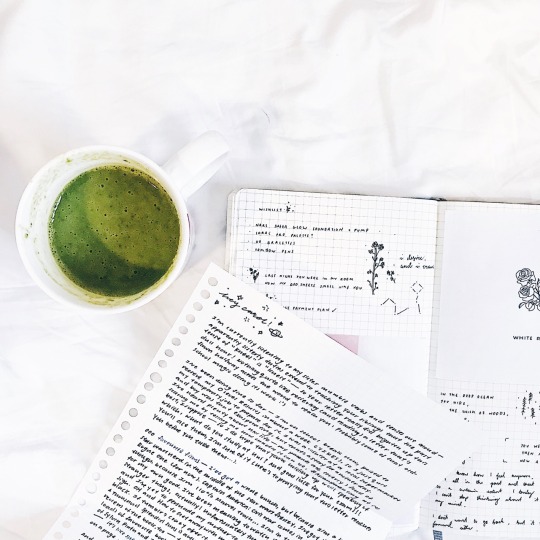



cafe studying + reading letters in bed ✨ ig: studylustre
13K notes
·
View notes
Text
study like a gryffindor: break out the good snacks and pump the music, use breaks as a time to work out, go to the professor’s office hours when you have questions, be confident in your ability to succeed
study like a hufflepuff: organize study groups, do your readings in your comfiest sweaters, write your own notes and study guides from the textbook, be unafraid of the hard work that studying takes
study like a ravenclaw: think critically when re-reading notes, quiz yourself while brushing your teeth, tackle the hardest practice problems, know that you have the skills to get it done
study like a slytherin: use every resource available to study, use your notes to make your own lecture, challenge yourself by setting goals even if you’re not sure you can achieve them, be proud when you do well
14K notes
·
View notes
Photo
Hope you're okay pal, updates are always greatly recieved! But look after yourself xx

~28/09/18~ Day 13/100 of my 100 Days of Productivity… #2!! ✨
Sorry that this is a day late… yesterday was tough in many respects… but I’m making improvements to get through it… I managed some maths, reading and an orchestra rehearsal outside lessons/a driving lesson though 💗🌷
Would anyone mind if I posted an update post? I might post one this evening…
Here are some gorgeous flowers! Wishing you all a lovely day/evening and look after yourself! x
9 notes
·
View notes
Text
20 important study skills/tips i’ve learned from my professors
1. start studying a week before every quiz/test. seriously.
2. watch youtube videos/ted talks on the topics you are learning about.
3. get lots of sleep! sleep helps you process the day’s events, including what you learned.
4. write out your notes. it’s proven that handwritten notes help you learn better than typed out notes.
5. don’t just read what your professor gives you. find academic journals, books, etc. that correspond with your subjects.
6. read the news! especially in the social sciences/humanities, connecting concepts with current events helps you understand and process more easily.
7. exercise! this doesn’t have to be going on runs or lifting weights, it could even just be going for a 20 minute walk. just get your blood pumping, it’ll help you focus.
8. study at your desk. it may be tempting to study in bed, but your brain connects your bed with sleep, so you’ll get tired more quickly.
9. reviewing notes doesn’t have to be something you sit down and do for an hour. skim through them and test your memory while eating breakfast!
10. expand your study time throughout the day to avoid burnout. for example, rather than studying for 5 hours straight, study for an hour here and there in between your activities.
11. make your notes organized and easy to read, but not distracting. bright colors and flashy notes may seem better, but can sometimes distract from the purpose of the notes.
12. use apps such as quizlet. this way, you can go through definitions while waiting in lines or walking to class.
13. it’s more important to know concepts rather than facts. for example, you should be able to take what you know and apply it to different situations, not just the situation the textbook gives you.
14. just because the professor doesn’t require you to read textbook, doesn’t mean you shouldn’t. it helps explain concepts in a different way than your professor, and a lot of times hearing two different explanations for the same concept helps you understand it.
15. read in advance. read the textbook before your professor begins going over the chapter, so when he/she does, you can easily follow what they are saying.
16. do any extra credit work that comes your way. even if you don’t need the extra boost now, you might later.
17. go to class!! if you always skip class and show up at office hours completely lost on the concepts, they’ll laugh in your face. they’ll take you 100x more seriously if you show up.
18. however, if you are sick, take a day off. it’s more beneficial to you in the long run.
19. learn how to say “no”. if you have an 8 am the next day, don’t stay out until midnight with your friends.
20. don’t stress too hard over quizzes. if you expect them to go horribly, they will. you got this.
35K notes
·
View notes
Text
during a job interview if you get asked, “What are three words your friends would use to describe you?” just use some traits from ur hogwarts house
244K notes
·
View notes
Photo
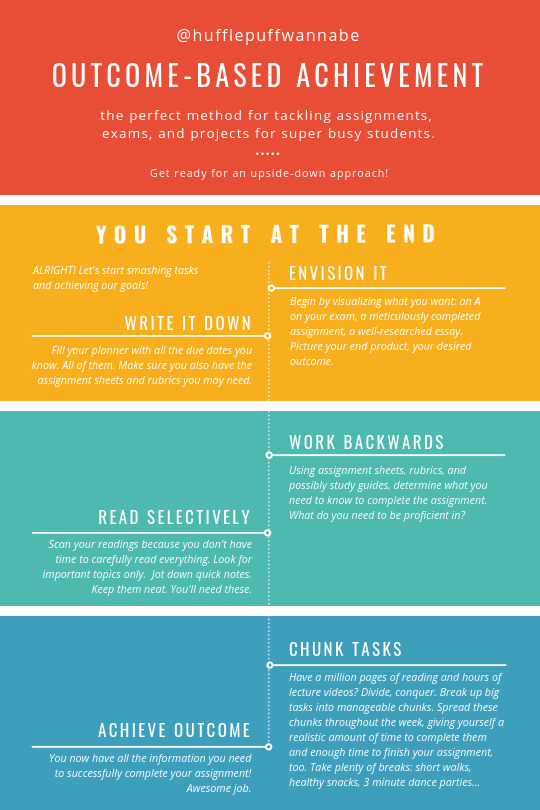
No one really properly prepared me for online classes and for this whole new world of the social sciences. So, this semester I feel like I’ve been reinventing the wheel re: how I approach getting my work done. I developed this method, which has proved very helpful. It ensures I get my assignments done on time, without wasting too much time on readings. NOTE: This method may not work for all types of classes, and it may not work for all people. For the record, I have issues with executive function and find sticking to it really helpful. Feel free to adapt it to make it work for you. If you have any questions, don’t hesitate to shoot me an ask.
2K notes
·
View notes
Text

i finished my a levels in june and received my results last week: an A in literature and A*s in religious studies and mathematics
over the last two years i have found things that work and things that don’t when it comes to a levels and revision:
1. revision timetables are important but also not really. what i mean is it is good to have a structure and to have a rough plan for the day. it is not good to plan every minute of every day or to have a timetable that schedules in nine hours of work. it is just unrealistic and disheartening when you inevitably fail to stick to it. i found out the hard way that a nine hour day is just not possible and at the end of the two weeks i managed it for i felt so drained.
what i found to work best is around five or six hour days, structured just like a school day. for me this was two hours from 8:50 until 10:50, a twenty minute break, then another two hours from 11:10 until 1:10, a 50 minutes lunch and then finally another hour.
this worked for me because i was finished by 3:00pm and felt as though i had a whole day to do what i wanted to do, whilst not feeling guilty as i has done five hours of revision.
another tip for revision timetables is to write each of your subjects down along with different ideas for what kind of revision you can do for them. for example for english i had quote revision, mind maps and essay plans as options.
2. highlighters are overrated. if you have to have them only highlight the really important things that you are likely to forget- there’s no point highlighting important things you already know really well. likewise, having everything highlighted defeats the point.
3. condense notes. it’s good to start with full notes that have everything you need to know and often this will be your textbook, sheets in class or what’s written in your notebook.
the best thing to do i have found is to condense notes twice: first into shorter, bullet pointed notes where you quickly outline key concepts but leave out the details and then secondly into words or bullet points that you keep forgetting.
4. don’t revise in your pyjamas. i found that getting up, showered and dressed early in the morning put me in a much better frame of mind for the day.
if revising early doesn’t work for you then don’t do it but for me it helped so much to be awake by 7:00 and start a little before 9:00. when i woke up later i found i constantly put off revision and, before i knew it, it was 8:00pm and i’d lost a day of revision.
5. teachers aren’t bad people, generally. they are there to help you and want you to succeed in their subject.
i honestly can’t say enough that if you need help or are in anyway unsure of anything in your course: ask your teacher for help. you are not going to look stupid for asking them to clarify details or explain things. you can always go after class if you’re too anxious to ask during.
6. try out different revision techniques that work for you before it’s too late. not everyone learns in the same way and the best way to work out what the best method of revision for you is to actually try different things.
revising with another person in your class can be helpful as well eg. in english me and a friend would test each other on quotes and also found it helpful to read notes out to each other. explaining/teaching others is a good way of knowing you understand something.
7. flash cards are also kinda overrated. a lot of people learn really well from them and they are a great way of checking you know facts or details.
however they take so long to make and are really easy to lose. if you’re organised and can get them done well before the exams then go for it, but i know so many people whose time spent making flash cards could’ve been used so much more efficiently.
a really good alternative to paper flash cards i and my friends used an app and website called Quizlet. you can make digital flashcards that can be accessed anywhere and there are loads of different learning techniques. you can also access other people’s flashcards on a subject which is really helpful for things like critic quotes.
8. work during your ‘free’ periods. it’s really tempting to chat with friends or go on your phone but you. will. regret. it.
9. money is nice but jobs can really limit your free time and revision time. unless you really do need the money i would recommend against a part time job.
10. don’t beat yourself up about missing a day or not getting the grade you wanted in a test. learn from your mistakes and try again.
this is just what worked for me and what didn’t work for me which is different for everyone. if you love highlighting everything and it actually works for you then that’s great.but if you’re struggling for how to revise or stay motivated one or more of these tips might work for you :)
358 notes
·
View notes
Text


082518 | this is my first (original) post, and i’m excited to finally be able to say that i’m apart of the studyblr community! here are some phys notes to start off my junior year :^)
145 notes
·
View notes
Photo

How I Take Textbook Notes Digitally
Gather supplies
Locate the chapter summary
Use the Google Docs app to voice type
Open Google Docs on a browser to reformat the document
Add vocab words and highlighted sentences that were in the chapter
Include charts/diagrams/images that help you understand the concepts
✦ I have a YouTube video to go with this post if you’d like to see these steps visually ✦
978 notes
·
View notes
Text
Preparing for a New Semester
You don’t have to buy all new stationery. Even if you’re going into college or a brand new school. Most of your old notebooks, folders and pens will work! Believe me, it’s not worth buying an $8 pen because you heard your favourite studyblr talk about it.
One thing you will need, however, is a planner or some sort of bullet journal. Personally, I prefer a planner so that it appears more structured. I enjoyed bullet journalling, but it wasn’t set up and laid out for me and that really stressed me out. It depends on what you like, but just be sure to have something to remind you of upcoming assignments, homework or tests.
Make sure you’re in the right headspace. Meditate, start exercising or talk it out. This helped me so much when going into college. I would usually be terrified in new social situations, but being in the right headspace really helped me. Also, if you’re just going into college, the first month is going to be confusing. Just accept it for what it is, because everybody else feels it too.
Enjoy it. The beginning of the semester is more than likely going to be the easiest time of the semester. Don’t get stressed out by the little things. For example, my best friend and I both took the same history module at the beginning of college and we were assigned to write a bibliography in a week. We stressed out so much that we didn’t get it finished until an hour before it was due. We realised that we were just stressing out the moment we handed it in, after all it was only worth 5% of our grade! Just do your best and don’t stress about the small things, like commas and full stops.
I hope you all have a good time in the next couple of months, no matter how stressful it is. Happy studying!
2K notes
·
View notes





